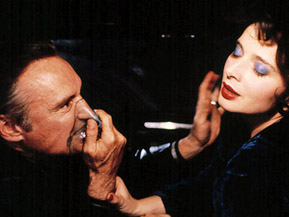|
|
I Was Robbed - Dennis Hopper in Blue VelvetBy Anthony DaquanoMay 31, 2010
Yet, despite Jeffrey's and the audience's misunderstanding of Booth, Hopper never lost insight into the central figure of the villain he was playing. For the viewer, Hopper makes Booth mysterious, terrifying and even mesmerizing. Booth switches between multiple personas, most notably that of baby and daddy when dealing with Dorothy (Isabella Rossellini). Hopper moves between these characters seamlessly, with Booth's inhaling of an unknown gas only adding to the appeal of the character. Booth's proclivity for the word fuck and Pabst Blue Ribbon contribute to the enormity of the character. To say Hopper chews the scenery would be an understatement. Hopper understood the larger than life persona of Booth. He knew explicitly how Frank would talk, walk, scream and laugh. Because he knows Booth explicitly, this approach never hinders the movie, but only adds to the overwhelming nature of Booth's personality. Unfortunately for Hopper, he also chose to star in the more sentimental Hoosiers. In honoring their time honored tradition of honoring an actor's less challenging work given multiple choices, the Academy leaned towards his fine but non-memorable work in Hoosiers. A sentimental drunk is far more accessible than a violent rapist, kidnapper and drug user, so Oscar's choice to side with his Hoosiers role is none too surprising. His performance in Hoosiers is not without merit, and I'm sure Hopper was honored. Yet, given the highly personal nature of the role of Frank, Hopper would have felt more honored to be recognized for his Blue Velvet performance. Yet, Oscar also likes showy performances like Hopper's, especially in a villainous role (recent wins by Anthony Hopkins, Daniel Day-Lewis and Kathy Bates come to mind). The fact that it was a showy yet restrained and powerful performance should have helped Hopper's cause, an example of scene chewing at its best - something that seems to be lost on Al Pacino. Hopper saw competition outside of himself in Tom Berenger and Willem Dafoe from Platoon, both fine performances but neither nearly as memorable as Hopper's. Denholm Elliot was nominated for a A Room with a View, and Michael Caine earned his first win in one of Woody Allen's strongest films, Hannah and Her Sisters. Of the five nominated performances, Michael Caine's is the best of the four I have viewed, and despite his fine performance, Caine's work doesn't equal Hopper's stunning creation of evil in Blue Velvet. Frank Booth has been named one of the greatest characters by both Premiere Magazine and the American Film Institute. Anyone that lists Pabst Blue Ribbion as his beer of choice while cutting off ears in his spare time certainly has a few issues. Though Frank Booth hasn't been seen by as wide of an audience as Hannibal Lecter and Anton Chigurh, Frank Booth remains burned into the moviegoing psyche.
|

|
|
|

|
Friday, November 1, 2024
© 2024 Box Office Prophets, a division of One Of Us, Inc.


